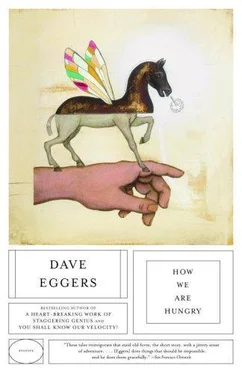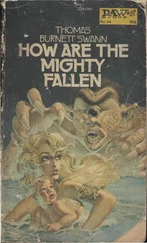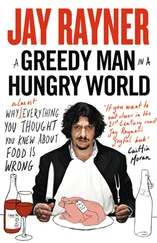Dave Eggers - How We Are Hungry
Здесь есть возможность читать онлайн «Dave Eggers - How We Are Hungry» весь текст электронной книги совершенно бесплатно (целиком полную версию без сокращений). В некоторых случаях можно слушать аудио, скачать через торрент в формате fb2 и присутствует краткое содержание. Год выпуска: 2005, Издательство: Vintage Canada, Жанр: Современная проза, на английском языке. Описание произведения, (предисловие) а так же отзывы посетителей доступны на портале библиотеки ЛибКат.
- Название:How We Are Hungry
- Автор:
- Издательство:Vintage Canada
- Жанр:
- Год:2005
- ISBN:нет данных
- Рейтинг книги:3 / 5. Голосов: 1
-
Избранное:Добавить в избранное
- Отзывы:
-
Ваша оценка:
- 60
- 1
- 2
- 3
- 4
- 5
How We Are Hungry: краткое содержание, описание и аннотация
Предлагаем к чтению аннотацию, описание, краткое содержание или предисловие (зависит от того, что написал сам автор книги «How We Are Hungry»). Если вы не нашли необходимую информацию о книге — напишите в комментариях, мы постараемся отыскать её.
A Heartbreaking Work of Staggering Genius
How We Are Hungry — читать онлайн бесплатно полную книгу (весь текст) целиком
Ниже представлен текст книги, разбитый по страницам. Система сохранения места последней прочитанной страницы, позволяет с удобством читать онлайн бесплатно книгу «How We Are Hungry», без необходимости каждый раз заново искать на чём Вы остановились. Поставьте закладку, и сможете в любой момент перейти на страницу, на которой закончили чтение.
Интервал:
Закладка:
“Short for Kojak?” Fish asked when they met. It was a dusty day, windy, the sun like a planet of sand. The mailman laughed. He laughed for about ten minutes over that one. Fish was flattered, then he was scared. Kojo liked to laugh, laughing in a big, unconvincingly expansive way, but he didn’t like to wear the postal pants. He always wore the shorts, no matter how cold it got.
He came into Fish’s house once for a beer, and he drank with his mouth all around the bottle, as if fellating it. Then he unrolled his sleeve and showed Fish a skin graft he’d got— just for the wack of it, he said. “Took some skin from my lower back and put it on my arm.” The pores in the new skin were smaller and the surface was smoother, less weathered. There are doctors, Kojo said, who’ll do anything for the right money.
A week later Kojo brought Fish a collage, the kind junior-high girls assemble, with phrases cut from women’s magazines—“Only Best Friends Know!” “Quiz: Are His Pals the Real Deal?”—pasted over pictures, cut from books, of Winnie the Pooh and Piglet flying kites together, walking through the woods at night, among the trees with muscular trunks.
Fish attracts these people. In high school there was an older guy, a senior when he was a sophomore, tall and bent backward. He had a huge, almost perfectly square head, and he wanted Fish to drive cross-country with him, though they’d talked only once, briefly, while they were watching the girls’ swim team practice.
“I like butterfly,” the guy had said. His name was either Brendan or Brandon or Stuart.
“Butterfly’s good,” Fish had said.
That had been their conversation, all of it, and two months later a breathless Brandon appeared, grinning, forehead wet with concentration, when Fish was walking out to soccer practice. “Don’t say no, Fish. We’re gonna head out and fuck this fucking school and drive to Florida. Fuck this fucking fuck!”
Fish, not wanting to say no, just said “Sorry,” and followed the rest of the team over the hill, to the upper field, rectangular but sloping on every side, like a freshly filled grave.
When Kojo presented the collage to Fish, insisting that he open it there in the doorway, Fish didn’t know what to say. He shook his head in a kind of awe, then thanked Kojo and made plans to see him three weeks hence — they’d have a beer at the end of the month, just tear it up, yeah — then, the next morning, Fish got himself a post-office box.
Fish is driving, slapping himself to stay alert, and he’s counting, to be sure it’s been seven times for Adam. One: the wrists (with an small saw on his thin, paper-white arms). Two: poison — he drank floor wax, first pouring it into a tall clear glass. Three: the gunshot to the stomach. Or the side of the stomach — the bullet grazed him and went through his window and into the Episcopal church next door. No one was killed or hurt, but Adam felt so bad about it that, four, he stabbed himself in the leg with a cleaver. Five: he tried bringing a hair dryer into the tub with him, but it was suicide-proof, apparently — it turned itself off, leaving Adam shivering, the water having gone cold while he’d got up the nerve. Six: what was six? A car driven into a tree? There was debate about whether that one had been intentional.
This time, two nights ago, Adam, half drunk — he was always impaired when he tried these things — jumped off a motel roof. At least that’s what Chuck heard from the paramedic who found Adam, unconscious in the parking lot, splayed like a buck on the hood of a truck. It was about forty feet down, Chuck said.
Adam could have jumped into a dry gorge a few blocks from the motel and he would have died for sure — the dropoff there was about a hundred feet. Instead, he fell four stories, into the courtyard, broke his collarbone, cracked his left leg, bent his spine.
The road is quiet. I-5 is split, a narrow valley between the comers and the goers, so Fish, his brain marshy and his eyes glazed, can see only the cars that are heading in his own direction. Fish likes to see the faces of people going the other way, to construct stories about them, wish them well or ill, but this is nothing, this drive — this is sorrow. It makes you want to freeze the world and shatter it with an ax.
This morning Fish’s pillow was soaked and his blanket was halfway out the window; he woke up hearing machine guns and screams. Not unusual, but this time he was on the plane, not watching it. It hadn’t taken off yet. There was something wrong, the air of the world had shrunk in on itself and then the men burst in. They pulled guns from a compartment and started shooting, endlessly, from the front to back, everything moving too slowly. Fish was in one of the last rows, listening to the shrieking, constant but undulating, and he was planning, clenching and unclenching his fists, looking around, between seats behind and in front of him, for a couple of people to come with him and help him end this. The fact that he was alive to hear the suffering meant that he was meant to stop it.
Through breakfast Fish was still operating under the blurry assumption the attack had been real, but CNN said nothing about it. Still, he was down, foggy, feeling remorse. He was crushing aluminum cans in the driveway, distracted, nerves shot, when Chuck called from Charlotte and described what Adam had done.
“I’m not going this time,” Fish said.
“I can get there four days from now,” Chuck said. “Do one day before I come. Make sure he’s not paralyzed. Check that they have him in a real room and everything.” Two years ago, after No. 3, Chuck arranged insurance for Adam, an expensive plan, and was frequently checking to make sure he was getting his money’s worth.
Chuck doesn’t know Adam as well as he pretends, and thus his benevolence can be less complicated than Fish’s. He never shared a bedroom with Adam. He never found Adam’s crusty tissues stuffed, like brains displayed in a jar, in a curvy blue bottle he’d won at a carnival. He never caught Adam rubbing down Mary’s legs after track, his hands wrapped like tentacles around her calves.
Fish is driving a rental car. He called the place where they pick you up in a sedan wrapped in brown paper. He called at about noon and they said they’d send the car over at two. Between twelve and two, he waited in his house. He watched baseball on TV. He put in a videotape of him and his father running in a Chicago marathon. His dad was wearing the brace he wore during those years, and he has a mustache. When he sees the camera, he turns around and runs backward. Then Fish’s mom drops the camera and the tape ends. Adam was no athlete. There was a game Fish played with him — it was Adam’s only good toy — where tiny metal football players move around on a field vibrating below them. It was a strange device, because you couldn’t really control the little bastards — you just watched as the field sent them jerking around, crowding together or falling alone.
Fish watched some of the national aerobics championship. He closed all the cabinets in his house and, using his new drill, tightened all the hinges. He walked to the stationery shop to see if he could buy Adam anything. They didn’t have much. He got a card congratulating him on his Bat Mitzvah, thinking that it was funny, knowing that Adam, who had to be told when to laugh, wouldn’t get the joke.
Outside, it was summer. He bought a glass-blue Sno-Kone, wrapped in the same weak waxy paper they’ve been using for a hundred years, from a tiny man with a cart. He held it gingerly between his fingers. It was glorious, really too perfect to change. He didn’t want to eat that ice — it was so right, that blue dome, like a tiny lost moon he could hold in his hand.
Читать дальшеИнтервал:
Закладка:
Похожие книги на «How We Are Hungry»
Представляем Вашему вниманию похожие книги на «How We Are Hungry» списком для выбора. Мы отобрали схожую по названию и смыслу литературу в надежде предоставить читателям больше вариантов отыскать новые, интересные, ещё непрочитанные произведения.
Обсуждение, отзывы о книге «How We Are Hungry» и просто собственные мнения читателей. Оставьте ваши комментарии, напишите, что Вы думаете о произведении, его смысле или главных героях. Укажите что конкретно понравилось, а что нет, и почему Вы так считаете.












